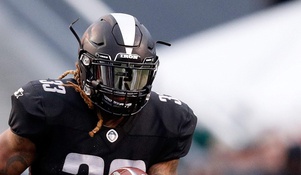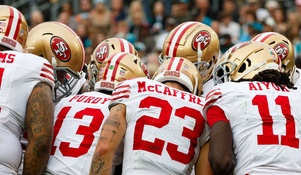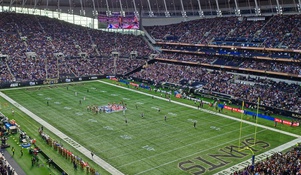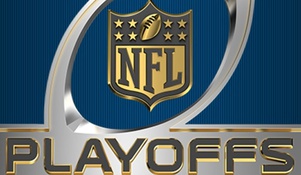The 2018 NFC Championship*
This article is not about what it should be.
This will not be about the Los Angeles Rams winning a 26-23 overtime stunner over the New Orleans Saints. This will not be about the Rams winning their first conference title in 18 years, nor will be about the LA Rams' first Super Bowl trip since 1979. This will not be about RB CJ Anderson carrying the mail for an ailing Todd Gurley. This will not be about Saints QB Drew Brees seeing another Super Bowl appearance go up in smoke when Rams defender Dante Fowler struck Brees' hand on a pass attempt that fluttered in the air for an interception that would ultimately seal the fate of the Fleur de Lis, as PK Greg Zuerlein nailed a 57 yard field goal to win the game. This piece will not be about any of that.
No, this piece will be about a 3rd & 10 play deep in Rams territory. This will be about Rams defensive back Nickell Robey-Coleman being out of position on a crucial down and distance. When the man he was assigned to cover, Saints receiver Tommylee Lewis, was about to make a reception that would at least extend New Orleans' drive to possibly make a game winning score to send the Saints to Super Bowl LIII, Robey-Coleman decided to hit Lewis, penalty be dammed, figuring he at least stopped a touchdown. But a funny thing happened on that play. The flag for defensive pass interference (or personal foul via a helmet to helmet hit) never flew. So instead of the Saints getting a fresh set of downs by penalty, PK Will Lutz would hit a chip shot field goal to give them a three point lead, only for that lead to vanish when Zuerlein kicked a 48 yarder with mere seconds remaining in regulation to send the game into overtime. For the record, this is not meant to diminish the Rams' significant accomplishment. Their play over the course of this season does not delegitimize their NFC title. What is in great hazard now, and going forward, is the legitimacy of NFL officiating.
To be fair, the men (and now, women) who call these games on the field wind up serving as the villains and/or scapegoats far more often than they should, since the ones doing the demonizing are the fans who felt slighted. They must watch their sections of the field, trying to make split second decisions on the actions of world class athletes. Most of the time, they get it right. But when an egregious error occurs, like this past game, it raises doubt on the league itself. So that is why the culpability of this travesty must not lay at the feet of the singular official who opted not to throw a yellow marker in a championship level game. The blame should lay at the feet of Commissioner Roger Goodell and the owners of the National Football League.
For the entirety of Goodell's tenure as the league's chief executive, The Shield's primary objective is to grow the bottom line. Not improving the product, mind you, but ensuring the men and women who are heavily invested in these 32 franchises see increasing returns. What has happened is indicative of that: reactive responses to public relations nightmares, intransigence in dealings with the players' union, and (specifically for our subject matter today) an increased points of emphasis burden on officials. Each time a new rule comes out, or is modified, the NFL makes it a point of emphasis for their officiating crews to call. These rules are often judgement calls, with vague wording in the league rulebook leaving multiple methods of interpretation. That is why incidental contact between receiver and defender is illegal contact for some officials, where it's a part of the game with others. Add to this encroachment from above due to legal liability (concussions and the threat of future lawsuits) and protection of stars (such as roughing the passer now being called if a defender lands his weight on a quarterback once the ball is released), and it only complicates officiating matters even further.
What the NFL needs to do is make a full assessment on the rules, both in letter and in spirit. Examine which ones need to be clarified, which need to be overhauled, and which ones are fine as they are. Implement a system that will reward good officiating (beyond postseason bids) and make it clearer to remove those that do not exhibit the competence to be on the field. Mistakes do happen, and the opportunity for redemption should be available. But continued unforced errors should make it evident that certain people are not cut out for this line of work. And give head coaches the opportunity to challenge virtually any play with their replay challenges. Patriots head coach Bill Belichick has been asking for this for years, and with more personal foul penalties being called due to helmet to helmet contact and nebulously changing roughing the passer rules, this idea is making more sense. As long as the number of challenges doesn't change (2 a game, with a third rewarded for both challenges being correct), the flow of the game would be minimally affected, if at all. But given how the NFL has operated for 13 years, don't hold your breath. Taking these actions would require leadership, a quality that has been sorely lacking at 345 Park Avenue, New York, New York for quite some time.
Your enraged scribe wishes to offer his sincerest apologies. This is not, nor should it ever be, the topic of discussion with the Super Bowl ever so close. But my most avid readers know that if something needs to be said, then the Gridiron Eye will be the one to say it. There leaves only three more statements to make in closing:
To the Los Angeles Rams, congratulations.
To the New Orleans Saints, my sincerest condolences.
And to the NFL...
Clean this mess up.





